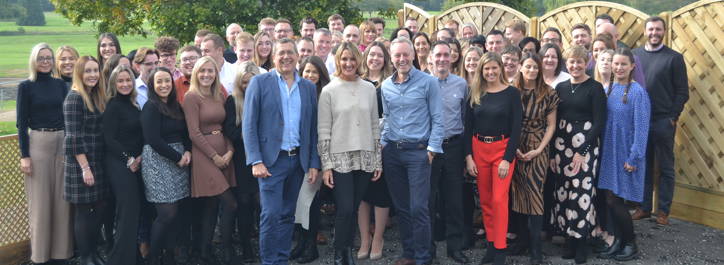Making the most out of the current recruitment trends
The COVID-19 pandemic has turned recruitment and employment strategies on their heads. And that means many businesses are having to rethink the way they attract, onboard and keep the very best talent. Here are our thoughts on the latest recruitment trends, and how organisations can use these to their advantage.
Let’s start by talking about recruitment in 2021. The watchword here was ‘demand’. That’s because last year demand for people increased quickly as confidence in the economy returned. As a result, salaries went up by as much as 15 to 20% in some areas. High levels of job vacancies in the Eastern region only added to this. The good news is that the job market in our region fared particularly well in 2021. In fact, we had the highest levels of employment in the whole of the UK, with 78.7 per cent of people employed.
Fighting for talent
Since the start of the new year this recruitment activity has continued to increase. But businesses are still struggling to recruit and retain people. Why? Well, some of this is down to environmental, social and governance factors – more and more people are choosing lifestyle and values over career prospects. So they’re taking themselves out of the market by moving away from cities, or going to work for smaller organisations that better fit their values. This is fuelling a battle for talent, with businesses having to work much harder to attract the top candidates. And, according to RSM UK’s ‘Modern workforce report’ for 2022 this is set to continue: ‘The battle for talent has only just begun. With 1.2 million vacancies in the UK in November last year, and job-to-job moves at an all-time high The Great Resignation is beginning to bite.’
All of this means that organisations must offer potential employees:
- a top-of-the-range employer brand
- excellent employee engagement
- better-than-average benefits packages
- attractive working environments with flexibility built-in.
How to stay ahead of the pack
So what can businesses do to make sure potential employees choose them over someone else? To answer this, we’re going to look at the recruitment trends we’ve seen across the market – trends we believe are here to stay in 2022 – and how you can use these to attract and keep the very best employees.
-
More virtual interviews
The pandemic and the move to working from home means many businesses have had to use virtual interviewing, which we’ve been learning as we go. But 18 months on, lots of companies now have slick processes in place for these – and it’s these organisations that are attracting the highest calibre candidates.
Why are virtual interviews a good idea? You don’t need to bring people together physically until the latter stages so it’s quick and easy to arrange interviews, speeding up the whole process. You can also reach a much wider geographical pool of candidates when people don’t have to travel to your office.
-
The rise of hybrid and flexible working
We’re yet to see the longer-term impact of hybrid working on retention and organisational culture. But it’s safe to say that most candidates are looking for this in some capacity before they’ll even consider a new job. So employers that have already adopted a flexible working model are going to be at the front of the queue when it comes to attracting the best candidates.
Having a hybrid working policy in place is also beneficial for businesses themselves. It means you can recruit from a much larger geographic area to find those vital skills – because if people know they only have to come into the office for one or two days a week, they’re more likely to consider travelling a bit further. And having a wider talent pool can only be good for diversity.
-
A focus on workplace culture
Workplace culture is nothing new – we’ve been talking about its importance when it comes to securing top talent for years. But it’s become more vital than ever this year, especially when candidates are trying to choose one organisation to work for over another. More and more we’re seeing them looking at potential employers’ policies on corporate social responsibility, diversity, equality and inclusion, and health and wellbeing. They’re also investigating how companies treated their existing employees through the pandemic.
All of this means companies are having to work harder than ever to give people access to this information. The ones that are leading the pack are using things like blogs, news articles, video content and social media to get their stories out into the marketplace.
-
More demand for digital skills
Employers have been expecting people to have digital skills for a long time now. But the pandemic has increased our need for them. In fact, a recent study by the Learning and Work Institute said that 92% of employers now consider basic digital skills as important as numeracy and literacy. And in June of this year a recruitment report by professional services firm KPMG highlighted that of the ten workflows they monitor, digital was the most in-demand skillset. This means businesses could struggle to recruit for roles that require these skills as they’re so in demand.
-
Increased personality profiling
Again, personality profiling in interview processes – giving candidates multiple-choice questions where they choose personality traits or statements that apply to them – is nothing new. It gives employers extra insights into how people are likely to interact with others in the workplace. It can also reveal how they might react and adapt to change or stressful situations. But we’re finding businesses are using personality profiling far more frequently in 2021 than in previous years. This is probably down to the fact that many haven’t been able to carry out face-to-face interviews due to the pandemic.
We think this type of data-driven recruitment is probably here to stay. For example, a high-tech manufacturing business we work with in Cambridge have been using personality profiling all the way through their business – for existing employees as well as new recruits. It’s helping them find new people with skills that fit well with their existing team members, meaning they’re hiring right first time in more instances. It’s also giving them more evidence to refer back to throughout the recruitment process. And it’s providing a really positive experience for candidates – even those who aren’t successful.
-
Working harder to attract the ‘unicorn’
The unicorn is that difficult-to-find perfect candidate who ticks all your boxes. A lot of organisations are telling us how much harder they’re having to work to find these people, and that the time it takes to fill a position is getting longer and longer. This is exacerbated by the fact that the previously predicted pandemic-related waves of resignations haven’t happened yet, possibly down to candidates having less confidence in the market, or not wanting to leave organisations that have treated them well.
So what’s the answer? Well, businesses need to start looking for more creative ways to recruit. For example, we recently worked with Virgin Wines to help them find a new chief technology officer to lead their ambitious five-year technology plan. To make sure they stood out from the crowd as an employer, we built them a microsite to publicise the job and, more importantly, really bring the Virgin brand to life. Strategies like this which show what’s great about working for your company, paired with a streamlined and efficient recruitment process, will really help when it comes to attracting those extra-special candidates.
Want to know more?
If you’re struggling to find the right candidates, we can help. Just contact us to find out more.



